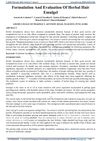 March 2023 in “International Journal of Advanced Research in Science, Communication and Technology”
March 2023 in “International Journal of Advanced Research in Science, Communication and Technology” Various medicinal plants like Polygonum multiflorum, Red ginseng extract, and Zizyphus jujuba can potentially treat hair loss, offering benefits like low cost and multiple ways of working. Other effective natural substances include Pygeum africanum, Seneroa, Urtica dioica, and more.
 1 citations,
February 2017 in “MOJ bioequivalence & bioavailability”
1 citations,
February 2017 in “MOJ bioequivalence & bioavailability” Treating hair loss effectively may require a multi-sided approach, using different treatments together, and topical treatments could be more effective and safer than oral ones.
July 2024 in “Actas Dermo-Sifiliográficas” Finasteride and dutasteride do not significantly change beard thickness in men.
 7 citations,
June 2021 in “Trends in Food Science and Technology”
7 citations,
June 2021 in “Trends in Food Science and Technology” Western diet may cause male pattern baldness; low glycemic diet with magnesium could help.

Kerascalp hair serum was found to be safe and effective in improving hair growth and strength in people with mild to moderate hair loss.
 4 citations,
November 2020 in “Journal of Cosmetic Dermatology”
4 citations,
November 2020 in “Journal of Cosmetic Dermatology” Most Facebook posts about hair loss treatments are promotional and not medically supported, with better quality information found on YouTube.
 December 2023 in “International Journal of Science and Research (IJSR)”
December 2023 in “International Journal of Science and Research (IJSR)” Herbal treatments are effective and preferred for hair loss with fewer side effects.
 29 citations,
July 2009 in “BJU international”
29 citations,
July 2009 in “BJU international” Blocking DHT production more strongly may help control advanced prostate cancer and improve quality of life.
 July 2012 in “The Journal of Urology”
July 2012 in “The Journal of Urology” Testosterone increases muscle mass regardless of DHT conversion blocking.
 2 citations,
December 2003
2 citations,
December 2003 Saw palmetto is an effective natural treatment for hair loss with minimal side effects.
 February 2020 in “Journal of emerging technologies and innovative research”
February 2020 in “Journal of emerging technologies and innovative research” The herbal hair emulgel was effective and stable for promoting hair growth, reducing dandruff, controlling hair fall, and preventing greying.
10 citations,
February 2017 in “European journal of neuroscience/EJN. European journal of neuroscience” The availability of certain hormones and specific stimulation patterns affect long-term synaptic changes in the male rat brain.

Minoxidil helps stimulate hair growth and enlarge small follicles in common hair loss, but doesn't stop it, and its effects can be boosted when combined with finasteride.
August 2021 in “Journal of The American Academy of Dermatology” Finasteride treatment changes hormone levels in male pattern baldness patients.
 1 citations,
October 2023 in “International journal of Ayurveda and pharma research”
1 citations,
October 2023 in “International journal of Ayurveda and pharma research” Herbal medications might be safer and more effective for hair loss than synthetic treatments.
 December 2024 in “Journal of Population Therapeutics and Clinical Pharmacology”
December 2024 in “Journal of Population Therapeutics and Clinical Pharmacology” Rosemary and kalonji seeds can improve hair health and treat hair conditions.
 5 citations,
December 1979 in “Clinical and Experimental Dermatology”
5 citations,
December 1979 in “Clinical and Experimental Dermatology” Anti-androgens are effective for female acne but less so for male-pattern hair loss, with side effects similar to birth control pills.
 7 citations,
August 2021 in “Heliyon”
7 citations,
August 2021 in “Heliyon” Phyllotex™ extract was found to significantly promote hair growth and protect against hair loss.
 August 2023 in “Stem Cell Research & Therapy”
August 2023 in “Stem Cell Research & Therapy” A substance called Cell-free fat extract can effectively treat common hair loss by increasing hair growth and density.
 22 citations,
September 1994 in “The Journal of Clinical Endocrinology and Metabolism”
22 citations,
September 1994 in “The Journal of Clinical Endocrinology and Metabolism” Finasteride reduces dihydrotestosterone, increases testosterone, and may treat hirsutism in women.
 54 citations,
February 1993 in “Endocrine reviews”
54 citations,
February 1993 in “Endocrine reviews” Androgen conjugates might be better indicators of skin sensitivity to hormones in women with excessive hair growth.
3 citations,
January 2022 in “Journal of neuroendocrinology” Sex hormones affect brain cells differently in males and females.

Male pattern baldness is a common hair loss in men caused by genetics and hormones, with treatments including drugs, hair transplants, and hair loss products.
 January 2022 in “Biomedical Reports”
January 2022 in “Biomedical Reports” Inaudible sound at 30 kHz can boost hair growth and decrease hair loss by promoting cell growth and reducing cell death in hair follicles.
 12 citations,
January 2005 in “Journal of Cosmetic Dermatology”
12 citations,
January 2005 in “Journal of Cosmetic Dermatology” AGA affects many, progresses differently, and early treatment is crucial.
 June 2023 in “Journal of chemical metrology”
June 2023 in “Journal of chemical metrology” A new method found unlisted drugs in two popular hair serums, posing a health risk.
 8 citations,
March 2020 in “Metabolites”
8 citations,
March 2020 in “Metabolites” Finasteride treatment changes urine metabolomics and steroid signatures, potentially monitoring effectiveness but may cause sexual side effects.
 2 citations,
October 2010 in “European Journal of Drug Metabolism and Pharmacokinetics”
2 citations,
October 2010 in “European Journal of Drug Metabolism and Pharmacokinetics” Researchers developed a quick and sensitive way to measure finasteride in blood using a small sample size.
 July 2024 in “Forum Dermatologicum”
July 2024 in “Forum Dermatologicum” Topical treatments for hair loss can be effective but need careful safety evaluation.
 110 citations,
August 2016 in “Drugs”
110 citations,
August 2016 in “Drugs” Minoxidil is the only FDA-approved topical drug for treating male or female pattern hair loss, and other medications like finasteride and dutasteride can also increase hair growth.

























